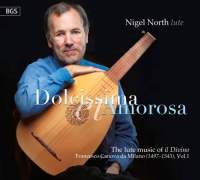Texte paru dans: / Appeared in: |
|
|
"Strongly recommended." |
|
|
Reviewer: Barry
Brenesal Last year, in Fanfare 37:1, I reviewed an album of lute music by Francesco Canova—also referred to as Francesco da Milano, or simply “Il Divino”—performed by Paul O’Dette on Harmonia Mundi 907557. Now we have another disc of Il Divino’s lute works, this time with lutenist Nigel North, and bearing the encouraging comment, “Volume 1.” Given approximately 140 surviving works in various period manuscripts, and roughly 35 pieces per album, that comes to four releases. If they’re all as good as this one, they’ll make a worthy set. The survival of so much of Canova’s music in circulated manuscripts indicates just how very respected he was in his lifetime. Listeners left in print eloquent praise of his improvisations, the way he quickly captured and then held an audience spellbound through his expressive ideas and phrasing, those melancholy, joyful, and witty by turns. One suspects that many of the fantasias and especially the simpler ricercars began life as those improvisations, no doubt subsequently burnished for exchange with connoisseurs, theorists, and other musicians. A hallmark of the composer’s style was his frequent but effortless-sounding counterpoint, as in the Fantasia 40—no doubt a skill that was acquired with much work. North’s first disc in his series makes for interesting comparison with the O’Dette I mentioned above. Through a combination of instrument and engineering, O’Dette gets a more resonant sound, with a deeper bass. North’s recording has a drier ambiance, with a slightly brighter top. Technically, there’s nothing to choose between them. Both can pass the tests of agility, tone, and balance in these pieces with seeming ease. Where works are performed by both, tempos are usually very similar; occasionally, North is slightly faster. O’Dette is given more to slowly spreading chords on or before many cadences—and at least in a few instances, on the first chord following a sectional cadence. North does it too, as their respective versions of tablatures of Richafort’s De mon trieste de desplaisir show, but he doesn’t make quite as much of the spread, or the subtle pause in harmonic movement that entails. Both musicians are inclined to group pieces that seem thematically related, though they aren’t banded together. O’Dette does this, for example, with the fantasias 56, 39, and 58; North, with De mon trieste, Canova’s Fantasia de mon triste, and the Fantasia et Ricercar “La compagna” that conclude his album. North also strives to create larger groups of pieces that move expressively from melancholy to earthly (cuts 8 through 13), or pursue a particular thematic interval (cuts 23 through 28). North’s makes better intellectual listening in my view, as it invites a greater exploration of how Canova made so very much at times out of a handful of small motives; O’Dette’s makes for better casual listening, as he strives to vary expressive content, tempo, and technical density with each successive cut. This is
a fine release, and a project that deserves careful watching. Strongly
recommended. | |
|
|
|
|
|
|
|
Cliquez l'un ou l'autre
bouton pour découvrir bien d'autres critiques de CD |
|




